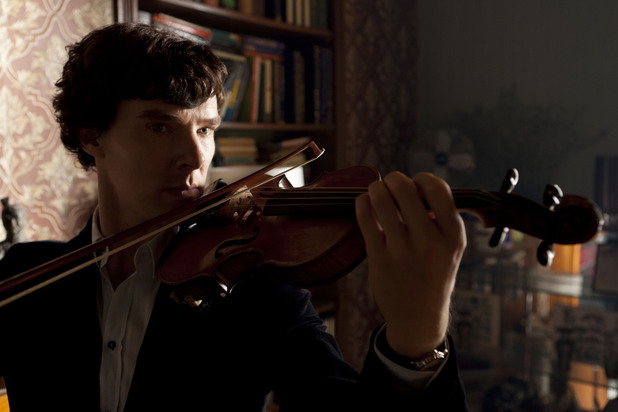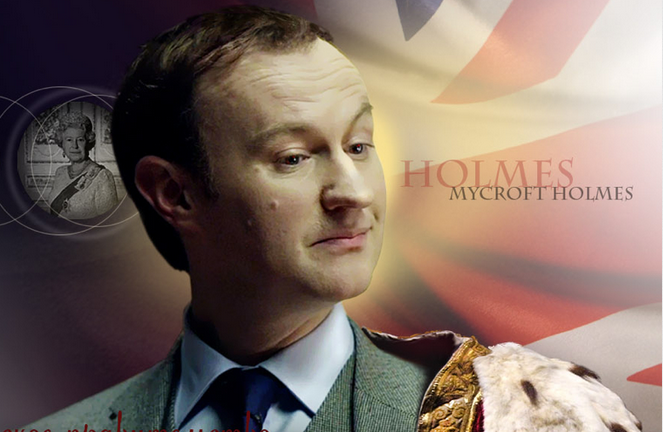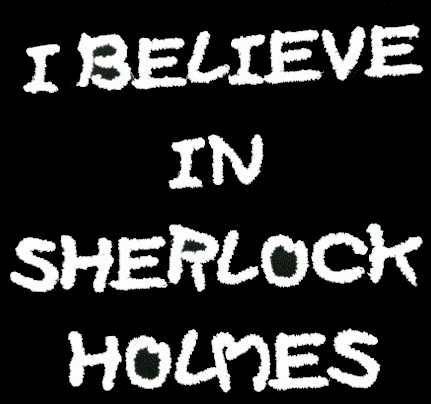
BBC Sherlock Fan Forum - Serving Sherlockians since February 2012.
- tobeornot221b
- One More Miracle
 Offline
Offline 
- From: Germany
- Registered: February 12, 2012
- Posts: 6,761
Re: John after the Fall
I'm currently in London. Been to Bart's this morning, took a lot of photos. Have been standing on the "stay exactly where you are!" spot - interesting and weird...Must think my theories over (not that I have one!). Not unusual by the way: Two red busses at the same time - this Sunday morning they happened to stand there exactly the same way they did in Reichenbach.
The small building between John and Bart's really blocks the entire view on the space between the phone booth and the bus stop - quite a big space! You could celebrate a big party there without being noticed by someone behind the building! ;)
Funny: Two notes are sticking to the wall of Bart's ("I believe in Sherlock Holmes and I always will") and to the busstop ("Molly Hooper knows the truth"). Needless to say that I've added one as well...;)
And yes: Even pigeons use to be there apparently.
---------------------------------------------------------------------------------------------------------------------------------------------
John: "Have you spoken to Mycroft, Molly, uh, anyone?"
Mrs Hudson: "They don’t matter. You do."
I BELIEVE IN SERIES 5!

- Sherlock Holmes
- Administrator
 Offline
Offline 
- From: 221B Baker Street
- Registered: February 7, 2012
- Posts: 5,162
Re: John after the Fall
tobeornot221b wrote:
Two notes are sticking to the wall of Bart's ("I believe in Sherlock Holmes and I always will") and to the busstop ("Molly Hooper knows the truth").
It makes my day to hear that! ![]()
---------------------------------------------------------------------------------------------------------------------------------------------
Eventually everyone will support Johnlock.
Independent OSAJ Affiliate

- Davina
- Moderator
 Offline
Offline 
- From: The Only Way is Essex UK
- Registered: February 9, 2012
- Posts: 9,714
Re: John after the Fall
Post-it notes have so many uses. I'm plotting a raid on a local bookshop this week shhhhh!
![]()
---------------------------------------------------------------------------------------------------------------------------------------------
Don't make people into heroes John. Heroes don't exist and if they did I wouldn't be one of them.

- tobeornot221b
- One More Miracle
 Offline
Offline 
- From: Germany
- Registered: February 12, 2012
- Posts: 6,761
Re: John after the Fall
Sherlock Holmes wrote:
tobeornot221b wrote:
Two notes are sticking to the wall of Bart's ("I believe in Sherlock Holmes and I always will") and to the busstop ("Molly Hooper knows the truth").
It makes my day to hear that!
Well, here's the proof:

and my tiny tribute:

---------------------------------------------------------------------------------------------------------------------------------------------
John: "Have you spoken to Mycroft, Molly, uh, anyone?"
Mrs Hudson: "They don’t matter. You do."
I BELIEVE IN SERIES 5!

- •
- kazza474
- High Functioning Sociopath
 Offline
Offline 
- From: Australia
- Registered: February 9, 2012
- Posts: 2,845
Re: John after the Fall
Sherlock Holmes wrote:
Although Sherlock must feel some "sentiment" himself, otherwise he wouldn't have made the jump...he just would have been like "OK kill them, who needs friends anyway?"
Ah, but as I just posted, he also had the incentive that if he didn't jump he'd be accused of Moriarty's murder. With that much 'heat' on him, they'd be leaving no stone unturned tracking him down.
So there were 2 incentives, both as pressing as the other.
____________________________________________________________________________________________
Also, please note that sentences can also end in full stops. The exclamation mark can be overused.
Sherlock Holmes 28 March 13:08
Mycroft’s popularity doesn’t surprise me at all. He is, after all, incredibly beautiful, clever and well-dressed. And beautiful. Did I mention that?
--Mark Gatiss
"I know that you believe you understand what you think I said, but I’m not sure you realize that what you heard is not what I meant."
Robert McCloskey
- Davina
- Moderator
 Offline
Offline 
- From: The Only Way is Essex UK
- Registered: February 9, 2012
- Posts: 9,714
Re: John after the Fall
Agreed.
![]()
---------------------------------------------------------------------------------------------------------------------------------------------
Don't make people into heroes John. Heroes don't exist and if they did I wouldn't be one of them.

- besleybean
- Threatened Knighthood
 Offline
Offline 
- From: Carnoustie, Angus, Scotland.
- Registered: October 4, 2012
- Posts: 21,380
Re: John after the Fall
Wow.
Am I in a minority here?
I think Sherlock jumped primarily to protect his friends.
It may also serve his purposes to disappear for a while.
---------------------------------------------------------------------------------------------------------------------------------------------------------------
- harleyq
- Mycroft's Contact
 Offline
Offline 
- From: New Jersey, USA
- Registered: November 2, 2012
- Posts: 413
Re: John after the Fall
tobeornot221b wrote:
Sherlock Holmes wrote:
tobeornot221b wrote:
Two notes are sticking to the wall of Bart's ("I believe in Sherlock Holmes and I always will") and to the busstop ("Molly Hooper knows the truth").
It makes my day to hear that!
Well, here's the proof:
This is cool, but I must confess it bothers me that it's grammatically incorrect. ![]()
Last edited by harleyq (November 3, 2012 4:58 pm)
----------------------------------------------------------------------------------------------------------------------------------------------------------------
This is a cash and carry world. You pay as you go. Sometimes it's a little. Mostly it's a lot. Sometimes it's all you have.
- tobeornot221b
- One More Miracle
 Offline
Offline 
- From: Germany
- Registered: February 12, 2012
- Posts: 6,761
Re: John after the Fall
harleyq wrote:
tobeornot221b wrote:
Sherlock Holmes wrote:
It makes my day to hear that!Well, here's the proof:
This is cool, but I must confess it bothers me that it's grammatically incorrect.
Yes, we definitely need the warning:
"Believers are only desired and permitted if grammatically correct." ![]()
---------------------------------------------------------------------------------------------------------------------------------------------
John: "Have you spoken to Mycroft, Molly, uh, anyone?"
Mrs Hudson: "They don’t matter. You do."
I BELIEVE IN SERIES 5!

- •
- besleybean
- Threatened Knighthood
 Offline
Offline 
- From: Carnoustie, Angus, Scotland.
- Registered: October 4, 2012
- Posts: 21,380
Re: John after the Fall
Way to make the fandom seem illiterate!
---------------------------------------------------------------------------------------------------------------------------------------------------------------
- The Doctor
- British Government
 Offline
Offline 
- From: Baker Street, Sydney Australia
- Registered: June 27, 2012
- Posts: 674
Re: John after the Fall
besleybean wrote:
Way to make the fandom seem illiterate!
Seeing what else this fandom is up to this should not even be considered an insult then, eh?
- besleybean
- Threatened Knighthood
 Offline
Offline 
- From: Carnoustie, Angus, Scotland.
- Registered: October 4, 2012
- Posts: 21,380
Re: John after the Fall
What have I missed this time?!
---------------------------------------------------------------------------------------------------------------------------------------------------------------
- veecee
- Official Blogger
 Offline
Offline 
- From: USA
- Registered: June 11, 2012
- Posts: 1,794
Re: John after the Fall
One of the notes says, "I believe in Sherlock Holmes and I'll always will." I guess you could call it a double future tense.
Last edited by veecee (November 4, 2012 8:47 pm)
- besleybean
- Threatened Knighthood
 Offline
Offline 
- From: Carnoustie, Angus, Scotland.
- Registered: October 4, 2012
- Posts: 21,380
Re: John after the Fall
I just call it bad grammar!
---------------------------------------------------------------------------------------------------------------------------------------------------------------
- tobeornot221b
- One More Miracle
 Offline
Offline 
- From: Germany
- Registered: February 12, 2012
- Posts: 6,761
Re: John after the Fall
besleybean wrote:
I just call it bad grammar!
I could be wrong - but there are things worse.
---------------------------------------------------------------------------------------------------------------------------------------------
John: "Have you spoken to Mycroft, Molly, uh, anyone?"
Mrs Hudson: "They don’t matter. You do."
I BELIEVE IN SERIES 5!

- •
- besleybean
- Threatened Knighthood
 Offline
Offline 
- From: Carnoustie, Angus, Scotland.
- Registered: October 4, 2012
- Posts: 21,380
Re: John after the Fall
You are mostly correct...
---------------------------------------------------------------------------------------------------------------------------------------------------------------
- Fillyjonk
- Homeless Network
 Offline
Offline 
- Registered: December 30, 2012
- Posts: 32
Re: John after the Fall
Sorry, late to the party (just caught the entire series and was hooked immediately).
Re: John after Reichenbach:
I do think he's in denial and is expressing an unrealistic wish there at the cemetery.
BUT... I also think Sherlock left some deliberate clues in his "note" of a phone call. "It's a trick. It's just a magic trick." Plus, the bizarro method he went from sitting in the lab one minute to being up on the roof the next - it's entirely illogical when John goes back to think it through later.
He might not have a real sense that Sherlock is alive, but he should have a lot of confusion about the obvious lies ("I'm a fake") and the mismatch to what John knows is the truth. Not to mention how thoroughly John knows that Moriarty is a very evil villain.
So, yes, denial, wishful thinking, and some subconscious deducing, I'd say.
Fillyjonk
Check my Tumblr for a musical tribute to Sherlock's devotion during series 3.
- Hera
- Lestrade's Aide
 Offline
Offline 
- From: Southwest of Germany
- Registered: January 11, 2013
- Posts: 102
Re: John after the Fall
About the plea at the grave: I think, it's wishful thinking and something like a remnant of illogical hope. John's words strike us as strange, because we wouldn't use them or similar words, when someone is already dead. We would only use those words in case of grave danger or terminal illness, when there is still hope, however slim. Many people turn to god and pray for help or recovery in the latest hour. Even people who normally don't believe in god and still don't. But in such situations, people figure, that they've got nothing to lose, so why not try? It's a normal reaction, but it's not based on facts or logic. --- So this is what goes in John's head, when he speaks those words. He doesn't really believe there is any hope left. But the dead person in Sherlock after all, which means John has much more straws to grasp than normal people, so his desperate hope lasts longer than normal people's, and is still present at the graveside, but it will fade eventually and he will accept his death... --- Of course, something could happen in the following days, weeks, months to ignite real hope in John, like strong evidence, but that's something else. If John already had had real hope in him at the graveside, he would have behaved differently.
Just my two cents.
- besleybean
- Threatened Knighthood
 Offline
Offline 
- From: Carnoustie, Angus, Scotland.
- Registered: October 4, 2012
- Posts: 21,380
Re: John after the Fall
John simply cannot believe Sherlock is dead, which is quite common for those suddenly bereaved and in traumatic circunstances.
But. John has already witnessed one fake death...
Plus, is he clever enough to work it out?
Might he see/hear things...
---------------------------------------------------------------------------------------------------------------------------------------------------------------
- Mattlocked
- One More Miracle
 Offline
Offline 
- From: Germany
- Registered: June 29, 2012
- Posts: 6,781
Re: John after the Fall
tobeornot221b wrote:
besleybean wrote:
I just call it bad grammar!
I could be wrong - but there are things worse.
Just found this and got a bit upset. Ever thought about the possibility of a "non native speaker" who left that note?
__________________________________
"After all this time?" "Always."
Good bye, Lord Rickman of the Alan

